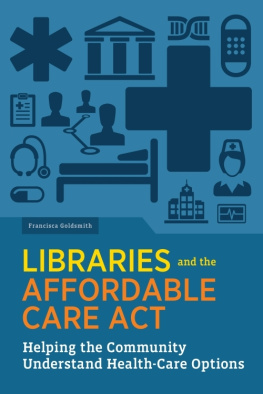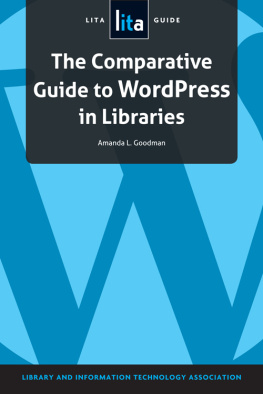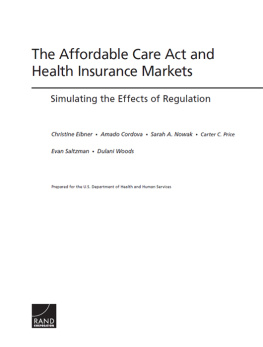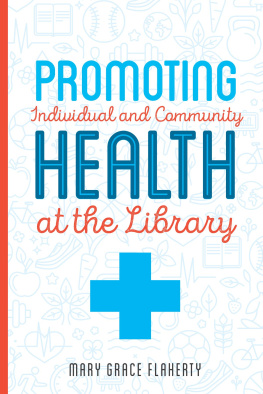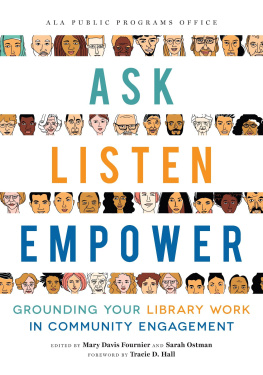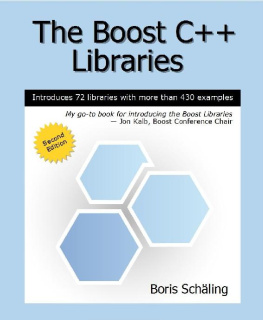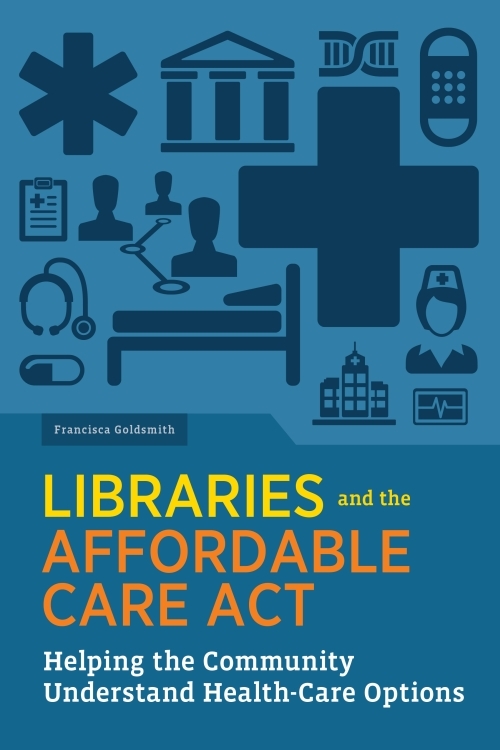
ALA Editions purchases fund advocacy, awareness, and accreditation programs for library professionals worldwide.
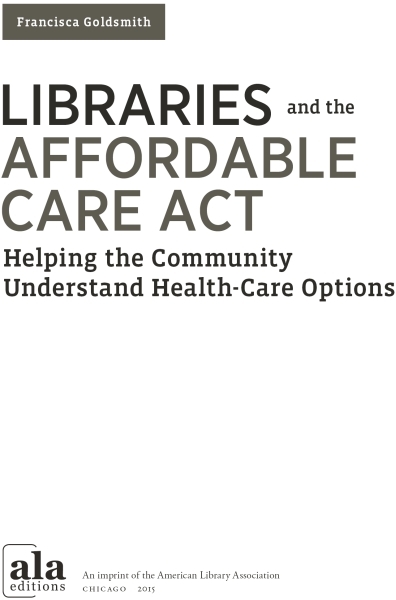
Francisca Goldsmith worked in public and academic libraries, both in the United States and Canada, for more than 25 years, before moving into full-time library staff development consulting and instruction, much of which through Californias IMLS-funded Infopeople Project. Most recently, that instructional work has focused on supporting public library staff and administrators in responding to community needs for access to health-care information, both related to Affordable Care Act policies and the changing technology landscape of health-care delivery in rural, immigrant, and other socially isolated communities. Her library experience and consulting includes frontline reference work, collection management, branch services management, and teen services development and advocacy. She has given many presentations on multiple literacies, serving underserved communities, and social media use for community and staff development. She earned an MS in Library and Information Sciences at Simmons College and has had a variety of advanced education experiences in support of her knowledge management and community advocacy work. This is her third book for ALA Editions.
2015 by the American Library Association
Extensive effort has gone into ensuring the reliability of the information in this book; however, the publisher makes no warranty, express or implied, with respect to the material contained herein.
ISBNs
978-0-8389-1288-1 (paper)
978-0-8389-1289-8 (PDF)
978-0-8389-1290-4 (ePub)
978-0-8389-1291-1 (Kindle)
Library of Congress Cataloging-in-Publication Data
Goldsmith, Francisca.
Libraries and the Affordable Care Act : helping the community understand health-care options / Francisca Goldsmith.
pages cm
Includes .
ISBN 978-0-8389-1288-1 (print: alk. paper) 1. LibrariesSpecial collectionsMedicine. 2. LibrariesSpecial collectionsHealth education. 3. Health educationLibrary resources. 4. United States. Patient Protection and Affordable Care Act I. Title.
Z688.M4G65 2015
025.2'761dc23 2014036521
Imagery Shutterstock, Inc.
Contents
Chapter One
The Affordable Care Act: Overview and Context
Chapter Two
Health Insurance and Insurance Exchange Structures
Chapter Three
Know Your Community
Chapter Four
From Affordable Care Act Policies to Functional Library Tactics
Chapter Five
Ethics and Legal Matters Related to Health-Care Information Services
Chapter Six
Health-Care Related Reference Interviewing
Chapter Seven
Literacy, Health Literacy, and Financial Literacy
Chapter Eight
Programming to Promote a Healthy Community: On the Ground and Online
Chapter Nine
Keeping Up Now, Documenting for Future Advocacy
T he past 30 years of my professional life have been dedicated to promoting literacy and information access through public library services, although not necessarily through public library buildings. In 2011, I was tapped by Californias Infopeople Project to develop and present a series of health information evaluation workshops, funded by a grant to UC Davis by the US Department of Commerces National Institute of Standards and Technology, addressing family support center health information providers (almost none of whom worked in or with whatever libraries were in or near these largely rural and isolated communities). In 2012, this on-ground series found library staff supplementation through an asynchronous series on Health and Wellness Competencies for non-medical library staff, which I developed under the guidance of UCLAs wonderful medical librarian Kelli Ham, supported by a grant from the US Broadband ARRA office. That opportunity was followed by an IMLS-funded project to develop and oversee an asynchronous learning series, again through Infopeople, on the Affordable Care Act and California public libraries. And that has led to a variety of contacts with OCLCs WebJunction project to inform its Health Happens in Libraries resource.
A lot of thank-yous are in order and offered warmly to: Kelli Ham of the National Network of Libraries of Medicine (Pacific Southwest Region); Infopeoples Eileen OShea; WebJunctions Liz Morris; ALA Editions editor Jamie Santoro, who jumped at the mildly floated idea that a guidebook fast was the support public libraries need; IMLS Director Susan Hildreth, who sees all the ways public libraries have an essential role in community health; Librarians Internet Index founder Carole Leita, who never stops asking the nitty-gritty questions that require more fact-digging; Canadian librarian friends who find privatized health insurance a community information nightmare they are happy not to have; and Alameda County Librarys Gary Morrison and Richard Bray for their inspirational trailblazing into this whole Affordable Care and the community library thicket.
Finally, this book is dedicated to the memory of Joachim Goldsmith (19422013) who, in the Affordable Care Act, finally discovered a topic of discussion he and his little sister could pursue with shared enthusiasm.
W hile the rollout of the 2010 Patient Protection and Affordable Care Act is regulated to unfold over a full decade, concentrated public attention began to scale up as media called attention to the upcoming health insurance changes taking effect between 2012 and the present. Many public library staff and administrators began to anticipate a challenge to their information role in communities large and small, urban and rural, well-endowed with information access and isolated from ready access to authoritative policy news. In other public library settings, opportunities to connect to communities were recognized and engaged with relative swiftness.
Notably, where the complex new policies and regulations were viewed as a challenge to effective and efficient library service, communities largely left the library alone as a resource. And, just as notably, this moved many library districts to a false perception that staff awareness and community guidance on this matter is a nonstarter.
Meanwhile, in those districts where staff investigated the ramifications of these health-care policy changes as they relate to the various sectors of their stakeholdersimportantly, including those stakeholders who just arent traditional library userslibraries did find essential and rewarding ways in which to build both community health and wellness capacity as well as enrich library access to previously invisible community sectors.
The purpose of the book here is to engage and encourage the awareness and service planning of public libraries in every state in supporting local community health. This book is intended to serve as a guide and library staff and administrator support toward your own local explorations and actions. There is no singular blueprint to offer or adopt. Instead, the chapters here provide conceptual matters to address locally with the knowledge and understanding only you can bring to the table.
The chapters are short, generous with bullet points for quick and ready reference, and include task lists to focus further your local planning and execution of health capacity building. In order to get all this to you so as to capture library service learnings from the initial open enrollment period of the Affordable Care Actmandated health insurance marketplaces and in time for the open enrollment period beginning November 2014, ALA Editions and I are taking the unusual tack of providing an analytical table of contents and a question-based chapter guide, rather than a traditional index. The intention is to keep the text as up-to-date as print books can possibly be in this period when we can use on-demand printing.
Next page
